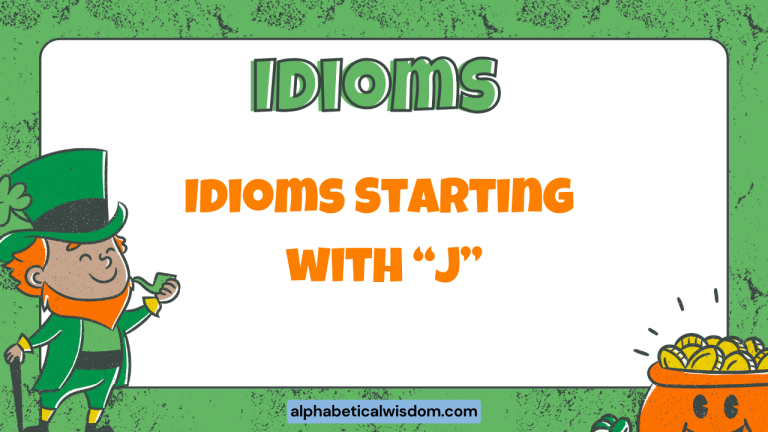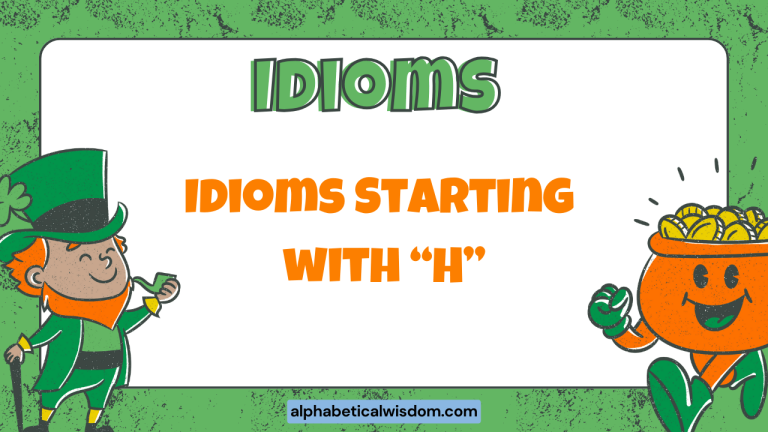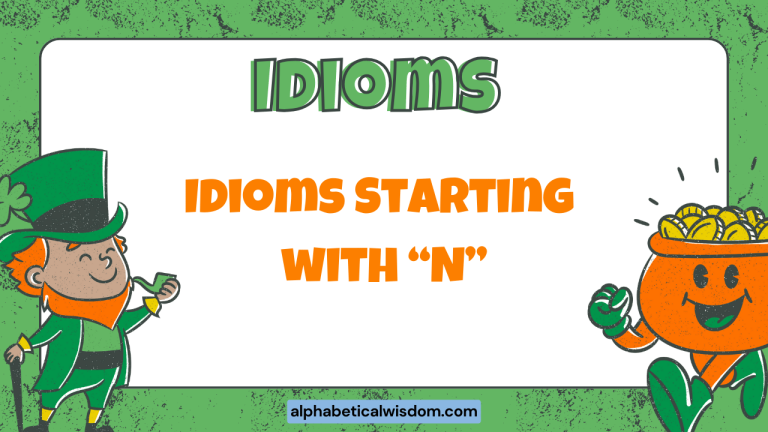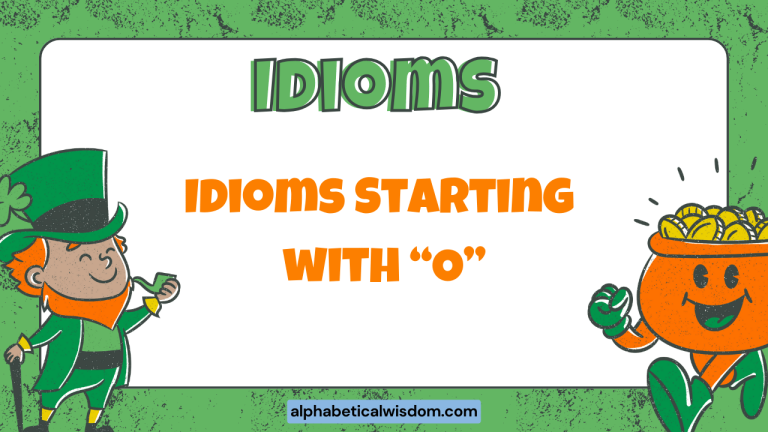Idioms Starting with F: Mastering Figurative Language
Idioms are an integral part of the English language, adding color and nuance to our communication. Understanding idioms, especially those starting with the letter ‘F,’ can significantly improve your comprehension and fluency.
This article provides a comprehensive guide to idioms starting with ‘F,’ exploring their meanings, origins, and proper usage. Whether you’re an English language learner or a native speaker looking to enrich your vocabulary, this guide will help you master these fascinating expressions.
By exploring these idioms, you’ll gain a deeper understanding of how language works beyond its literal interpretations. This knowledge will enable you to communicate more effectively, understand complex texts, and appreciate the subtle humor and cultural references embedded in idiomatic expressions.
This article is designed for learners of all levels, from beginners to advanced speakers, who want to enhance their linguistic skills and cultural awareness.
Table of Contents
- Introduction
- Definition of Idioms
- Structural Breakdown of Idioms
- Types and Categories of Idioms Starting with F
- Examples of Idioms Starting with F
- Usage Rules for Idioms
- Common Mistakes When Using Idioms
- Practice Exercises
- Advanced Topics in Idioms
- Frequently Asked Questions (FAQ)
- Conclusion
Definition of Idioms
An idiom is a phrase or expression whose meaning cannot be understood from the literal meanings of its individual words. Instead, the phrase has a figurative meaning that is unique to the language and culture in which it is used.
Idioms are often colorful and imaginative, reflecting the history and traditions of a particular language community. They add depth and richness to communication, but they can also be challenging for language learners due to their non-literal nature.
For example, the idiom “kick the bucket” does not literally mean to kick a bucket. Instead, it means “to die.” Understanding idioms requires familiarity with the cultural context and the specific figurative meaning assigned to the phrase.
Idioms are commonly used in everyday conversation, literature, and media, making it essential for language learners to grasp their meanings and usage.
Structural Breakdown of Idioms
Idioms can consist of various structural elements, including verbs, nouns, adjectives, and prepositions. The structure of an idiom is often fixed, meaning that the words cannot be changed or rearranged without altering the meaning or making the phrase nonsensical.
Understanding the structure of idioms can help learners recognize and remember them more easily.
Many idioms follow specific patterns, such as verb-preposition combinations (e.g., “face up to”), noun phrases (e.g., “a fair-weather friend”), or adjective-noun combinations (e.g., “a false alarm”). Some idioms are also based on metaphors or similes, using figurative language to create a vivid and memorable image.
Analyzing the structural components of idioms can provide valuable insights into their meanings and origins.
Types and Categories of Idioms Starting with F
Idioms starting with ‘F’ can be categorized based on their thematic content or the grammatical structure they employ. Here are some common categories:
- Family-Related Idioms: These idioms relate to family members, relationships, or dynamics (e.g., “fly the coop”).
- Financial Idioms: These idioms involve money, business, or economic matters (e.g., “foot the bill”).
- Feeling and Emotion Idioms: These idioms express emotions, moods, or psychological states (e.g., “fall head over heels”).
- Fate and Fortune Idioms: These idioms describe luck, destiny, or chance (e.g., “fortune favors the bold”).
- Food-Related Idioms: These idioms use food as a metaphor to describe situations or characteristics (e.g., “food for thought”).
Each category represents a different aspect of life and provides a unique perspective on how language can be used to express complex ideas and emotions. By studying these categories, learners can gain a deeper appreciation for the richness and diversity of idiomatic expressions.
Examples of Idioms Starting with F
This section provides an extensive list of idioms that start with the letter ‘F,’ categorized by theme to facilitate learning and understanding. Each idiom is accompanied by its meaning and example sentences to illustrate its usage in context.
Family-Related Idioms
Family-related idioms often describe relationships, behaviors, or situations within a family context. They can be used to express a range of emotions, from love and affection to frustration and conflict.
The following table provides examples of family-related idioms that start with ‘F,’ along with their meanings and illustrative sentences. Understanding these idioms can help you better describe family dynamics and relationships.
| Idiom | Meaning | Example Sentence |
|---|---|---|
| Fly the coop | To leave home or a restrictive situation, often suddenly or without permission. | After years of living under his parents’ strict rules, he decided to fly the coop and move to another city. |
| Flesh and blood | A close relative, typically a family member. | Despite their differences, she always felt a strong connection to her flesh and blood. |
| Follow in someone’s footsteps | To do the same job or activity as someone else, especially a parent or ancestor. | He decided to follow in his father’s footsteps and become a doctor. |
| Family man | A man who is devoted to his family and spends a lot of time with them. | John is a real family man; he always puts his wife and kids first. |
| Father figure | Someone who provides guidance and support like a father, especially when one’s own father is absent. | Mr. Thompson was a father figure to many of the students at the school. |
| First-born | The first child born in a family. | As the first-born, she always felt a sense of responsibility towards her younger siblings. |
| Fair-haired child | A favorite or privileged person. | He was always the fair-haired child in the family, receiving more attention and opportunities. |
| Fall from grace | To lose status, respect, or favor. | The politician fell from grace after the scandal was revealed. |
| Feather your nest | To enrich oneself, often dishonestly or selfishly. | Some corrupt officials use their positions to feather their own nests. |
| Find your feet | To become established or confident in a new situation. | It took her a few months to find her feet in the new job. |
| Fit as a fiddle | In excellent physical condition. | Despite his age, he’s as fit as a fiddle and still runs marathons. |
| Fix someone’s wagon | To punish or get revenge on someone. | If he tries to cheat me again, I’m going to fix his wagon. |
| Flame out | To fail or stop suddenly after a promising start. | The young athlete flamed out after a series of injuries. |
| Flash in the pan | Something that shows initial promise but fails to deliver. | The new product was just a flash in the pan; it didn’t last long on the market. |
| Flat broke | Having no money at all. | After the gambling trip, he was flat broke. |
| Flogging a dead horse | Wasting effort on something that is already lost or impossible. | Trying to convince him to change his mind is like flogging a dead horse. |
| Follow your nose | To go straight ahead; to use your intuition. | Just follow your nose and you’ll find the bakery. |
| Food for thought | Something to think about; something that provokes consideration. | The speaker’s comments provided a lot of food for thought. |
| Fool’s errand | A task or activity that has no chance of success. | He sent me on a fool’s errand, knowing I wouldn’t find what he asked for. |
| For a song | At a very low price. | I bought the antique chair for a song at the flea market. |
| For good | Permanently; forever. | He left the country for good after the scandal. |
| For the birds | Worthless; uninteresting. | That movie was for the birds; I couldn’t even finish watching it. |
| Forty winks | A short nap. | I’m going to take forty winks before we go out. |
| Foul play | Suspicious or criminal activity. | The police suspect foul play in his disappearance. |
| From scratch | From the beginning; using basic ingredients. | She built the company from scratch with hard work and dedication. |
| From the horse’s mouth | From a reliable or authoritative source. | I heard it from the horse’s mouth that he’s leaving the company. |
| Full of beans | Lively and energetic. | The kids were full of beans after their summer vacation. |
Financial Idioms
Financial idioms are commonly used in business and everyday conversations to describe money-related situations. They can refer to earning, spending, saving, or losing money.
The following table provides examples of financial idioms that start with ‘F,’ along with their meanings and example sentences. Understanding these idioms can help you better navigate financial discussions and understand economic contexts.
| Idiom | Meaning | Example Sentence |
|---|---|---|
| Foot the bill | To pay for something, typically a large expense. | The company agreed to foot the bill for the entire project. |
| Fall into money | To suddenly become rich, often unexpectedly. | She fell into money when her grandfather passed away. |
| Fifty-fifty | Equally divided; shared equally. | They agreed to split the profits fifty-fifty. |
| Fork out | To spend money, often reluctantly. | I had to fork out a lot of money to fix my car. |
| Face the music | To accept the consequences of one’s actions. | After getting caught cheating, he had to face the music. |
| Fair shake | A fair chance or opportunity. | Everyone deserves a fair shake in life. |
| Fan the flames | To make a situation worse; to increase the intensity of something. | His comments only fanned the flames of the argument. |
| Fast track | A quick route to success or promotion. | She was on the fast track to becoming a partner in the firm. |
| Feast or famine | A situation where there is either abundance or scarcity. | The freelance market is often a feast or famine situation. |
| Few and far between | Not common; rare. | Opportunities like this are few and far between. |
| Fine-tooth comb | To examine something very carefully. | The auditors went through the accounts with a fine-tooth comb. |
| Fishy | Suspicious; questionable. | Something about his story seemed fishy. |
| Fit to be tied | Extremely angry or upset. | She was fit to be tied when she found out what happened. |
| Five o’clock shadow | The stubble that appears on a man’s face late in the afternoon. | He had a noticeable five o’clock shadow by the end of the day. |
| Fixed income | An income that does not change over time. | Many retirees live on a fixed income. |
| Flash before your eyes | To experience a rapid recollection of past events. | As I nearly crashed the car, my whole life flashed before my eyes. |
| Flea market | A market where used or inexpensive goods are sold. | I found some great bargains at the flea market. |
| Flip the bird | To give someone the middle finger. | He flipped the bird at the driver who cut him off. |
| Float a loan | To obtain a loan. | The company decided to float a loan to expand its operations. |
| Follow suit | To do the same thing as someone else. | When one company lowered its prices, the others followed suit. |
| For all the world | In every possible way; absolutely. | He looked for all the world like his father. |
| For crying out loud | An expression of frustration or annoyance. | For crying out loud, can’t you be quiet for once? |
| For the heck of it | For no particular reason; just for fun. | We decided to go camping for the heck of it. |
| For the long haul | For a long period of time. | They are committed to the project for the long haul. |
| For what it’s worth | An expression used to introduce a suggestion or opinion. | For what it’s worth, I think you should try a different approach. |
| From pillar to post | From one place to another; restlessly. | She was sent from pillar to post trying to get the issue resolved. |
| Full steam ahead | To proceed with maximum effort and speed. | With the new funding, the project is now full steam ahead. |
Feeling and Emotion Idioms
Feeling and emotion idioms are used to express various emotional states and reactions. They can convey happiness, sadness, anger, fear, or any other emotion in a figurative way.
The following table provides examples of feeling and emotion idioms that start with ‘F,’ along with their meanings and example sentences. Understanding these idioms can help you better express and understand emotional nuances in communication.
| Idiom | Meaning | Example Sentence |
|---|---|---|
| Fall head over heels | To fall deeply in love. | They fell head over heels for each other at first sight. |
| Face like thunder | To have a very angry or gloomy expression. | He had a face like thunder when he heard the news. |
| Feel blue | To feel sad or depressed. | She’s been feeling blue since her vacation ended. |
| Faint of heart | Easily frightened or discouraged. | This roller coaster is not for the faint of heart. |
| Fall by the wayside | To fail to finish something; to drop out. | Many of the original participants fell by the wayside during the long project. |
| False alarm | A situation that causes unnecessary panic or concern. | The fire turned out to be a false alarm. |
| Far cry | Very different from something else. | The new restaurant is a far cry from the old one. |
| Fat chance | Little or no chance. | Fat chance he’ll agree to that proposal. |
| Feather in your cap | An achievement to be proud of. | Winning the award was a feather in her cap. |
| Feel the pinch | To experience financial difficulty. | Many families are feeling the pinch due to rising costs. |
| Few and far between | Rare; not common. | Opportunities like this are few and far between. |
| Fight tooth and nail | To fight fiercely for something. | They had to fight tooth and nail to win the contract. |
| Figure of speech | An expression that uses language in a non-literal way. | “Simile” and “metaphor” are types of figure of speech. |
| Fill someone’s shoes | To take someone’s place and do the job as well as they did. | It’s going to be hard to fill his shoes when he retires. |
| Find your voice | To express your opinions or feelings confidently. | She finally found her voice and started speaking up in meetings. |
| Finger-licking good | Delicious; very tasty. | The barbecue ribs were finger-licking good. |
| First come, first served | The first people to arrive will be served first. | Seating is first come, first served, so arrive early. |
| Fish out of water | Someone who feels uncomfortable or out of place. | He felt like a fish out of water at the fancy party. |
| Fishing for compliments | Trying to get people to say nice things about you. | She was clearly fishing for compliments when she asked if her dress looked good. |
| Fit the bill | To be suitable for a particular purpose. | This tool fits the bill perfectly for the job. |
| Five-finger discount | Stealing something. | He got the item at a five-finger discount, which means he stole it. |
| Fix up | To arrange a date for someone. | My friends are trying to fix me up with someone. |
| Fly off the handle | To lose your temper suddenly. | He flew off the handle when he heard the news. |
| Fold up | To collapse or give way. | The team folded up under pressure in the final game. |
| Follow your heart | To do what you really want to do, even if it’s difficult. | She decided to follow her heart and pursue a career in art. |
| For a penny | Very cheaply. | You can buy these trinkets for a penny on the street corner. |
Fate and Fortune Idioms
Fate and fortune idioms often refer to luck, destiny, or chance. They can describe situations where outcomes are beyond one’s control or influenced by external forces.
The following table provides examples of fate and fortune idioms that start with ‘F,’ along with their meanings and example sentences. Understanding these idioms can help you better describe the role of chance and destiny in various situations.
| Idiom | Meaning | Example Sentence |
|---|---|---|
| Fortune favors the bold | Success is more likely to come to those who take risks. | He invested all his savings in the new venture, believing that fortune favors the bold. |
| Finger of fate | An event or influence that determines the course of one’s life. | It seemed like the finger of fate intervened when he met his future wife at the airport. |
| Fatal attraction | An irresistible but destructive attraction. | Their relationship was a fatal attraction that led to heartbreak. |
| Fair weather friend | Someone who is only a friend when things are going well. | He turned out to be a fair-weather friend who disappeared when I needed help. |
| Get something off your chest | To talk about something that has been bothering you. | I need to get something off my chest; can we talk? |
| Get the ball rolling | To start something; to initiate action. | Let’s get the ball rolling on this project by scheduling a meeting. |
| Get the picture | To understand something. | Do you get the picture now, or do I need to explain it again? |
| Get under someone’s skin | To annoy or irritate someone. | His constant complaining really gets under my skin. |
| Get wind of something | To hear a rumor or learn about something secret. | I got wind of their plans to merge the companies. |
| Give and take | Compromise; mutual concessions. | A successful relationship requires give and take from both partners. |
| Give someone a run for their money | To provide strong competition. | The new team is going to give the champions a run for their money. |
| Give someone the cold shoulder | To ignore someone deliberately. | She gave him the cold shoulder after their argument. |
| Go against the grain | To do something that is contrary to popular opinion or custom. | His decision to quit his job went against the grain. |
| Go bananas | To become very excited or crazy. | The crowd went bananas when the band came on stage. |
| Go broke | To lose all your money. | He went broke after investing in the failed business venture. |
| Go down in flames | To fail spectacularly. | The project went down in flames due to poor planning. |
| Go figure | An expression of surprise or disbelief. | He said he wasn’t coming, but then he showed up. Go figure! |
| Go for broke | To risk everything in an attempt to succeed. | He decided to go for broke and bet all his money on the final race. |
| Go nuts | To become crazy or irrational. | She went nuts when she heard the news. |
| Go the extra mile | To do more than what is expected. | He always goes the extra mile to help his colleagues. |
| Go through the roof | To increase dramatically; to become very angry. | Prices for gasoline have gone through the roof. |
| Go to town | To do something with great enthusiasm and thoroughness. | She really went to town decorating the house for the holidays. |
| Go with the flow | To accept events as they happen without trying to control them. | Sometimes it’s best to just go with the flow and see what happens. |
| Good Samaritan | Someone who helps others, especially strangers, in need. | The Good Samaritan stopped to help the stranded motorist. |
| Grass is always greener | The things other people have always seem better than your own. | He always thinks the grass is always greener on the other side. |
| Grave situation | A very serious or dangerous situation. | The hostages were in a grave situation. |
Food-Related Idioms
Food-related idioms use references to food to describe various situations, characteristics, or behaviors. These idioms often add a humorous or colorful element to communication.
The following table provides examples of food-related idioms that start with ‘F,’ along with their meanings and example sentences. Understanding these idioms can help you appreciate the creative use of language in expressing everyday concepts.
Usage Rules for IdiomsUsing idioms correctly requires understanding their specific meanings and contexts. Here are some rules to follow when using idioms:
- Understand the Meaning: Always ensure you know the exact meaning of the idiom before using it.
- Consider the Context: Use idioms in appropriate situations and with the right audience.
- Maintain Correct Structure: Do not alter the words or structure of the idiom, as this can change its meaning.
- Be Mindful of Tone: Idioms can be informal, so avoid using them in formal or professional settings unless appropriate.
- Practice Regularly: The more you use idioms, the more comfortable and confident you will become with them.
Following these rules will help you use idioms effectively and avoid common mistakes.Common Mistakes When Using IdiomsOne of the biggest challenges in using idioms is avoiding common mistakes. These mistakes can often lead to confusion or miscommunication.Here are some common pitfalls to watch out for:
- Literal Interpretation: Interpreting idioms literally instead of understanding their figurative meaning.
- Incorrect Word Usage: Changing the words of an idiom, which can alter its meaning or make it nonsensical.
- Misunderstanding Context: Using an idiom in an inappropriate context or situation.
- Overuse of Idioms: Using too many idioms in a conversation, which can make your speech sound unnatural or forced.
- Cultural Misunderstandings: Using idioms that are not commonly understood in certain cultures or regions.
Being aware of these common mistakes can help you avoid them and use idioms more effectively.Practice ExercisesTo reinforce your understanding of idioms starting with ‘F,’ try the following exercises. These exercises will help you practice using idioms in context and improve your overall comprehension.
Exercise 1: Fill in the Blanks
Complete each sentence with the appropriate idiom from the list below.
- After losing his job, he was __________.
- She decided to __________ and pursue her dream of becoming a writer.
- The project __________ due to lack of funding.
Idiom List:
- Flat broke
- Follow her heart
- Went down in flames
Answers:
- After losing his job, he was flat broke.
- She decided to follow her heart and pursue her dream of becoming a writer.
- The project went down in flames due to lack of funding.
Exercise 2: Multiple Choice
Choose the correct meaning of the idiom in each sentence.
- He had to face the music after getting caught cheating.
- To enjoy a musical performance
- To accept the consequences of one’s actions
- To play a musical instrument
- She has a green thumb when it comes to gardening.
- A talent for painting
- A talent for cooking
- A talent for gardening
- They decided to go the extra mile to help their clients.
- To travel a long distance
- To do more than what is expected
- To avoid helping others
Answers:
- He had to face the music after getting caught cheating.
- To enjoy a musical performance
- To accept the consequences of one’s actions
- To play a musical instrument
- She has a green thumb when it comes to gardening.
- A talent for painting
- A talent for cooking
- A talent for gardening
- They decided to go the extra mile to help their clients.
- To travel a long distance
- To do more than what is expected
- To avoid helping others
Advanced Topics in IdiomsFor advanced learners, exploring the etymology and cultural significance of idioms can provide a deeper understanding of their usage and impact. Here are some advanced topics to consider:
- Etymology of Idioms: Researching the origins and historical context of specific idioms.
- Cultural Significance: Understanding how idioms reflect the values, beliefs, and traditions of a particular culture.
- Regional Variations: Exploring how idioms differ across different regions or dialects of the English language.
- Idioms in Literature: Analyzing how authors use idioms to enhance their writing and convey deeper meanings.
- Translation Challenges: Examining the difficulties in translating idioms from one language to another.
By delving into these advanced topics, you can gain a more nuanced and sophisticated understanding of idiomatic expressions.Frequently Asked Questions (FAQ)
Q: Why are idioms important in English?
A: Idioms add color and depth to the English language, making communication more expressive and nuanced. They also reflect cultural values and historical contexts.
Q: How can I improve my understanding of idioms?
A: Regular practice, exposure to English media, and studying idioms in context can significantly improve your understanding.
Q: Are idioms the same in all English-speaking countries?
A: No, idioms can vary significantly between different English-speaking countries and regions.
Q: Can I create my own idioms?
A: While it’s possible to create new expressions, they are not considered idioms until they are widely accepted and understood.
Q: How do I avoid misusing idioms?
A: Always ensure you understand the meaning and context of an idiom before using it. Practice using idioms in different situations to improve your accuracy.
ConclusionMastering idioms starting with ‘F’ can significantly enhance your English language skills and cultural understanding. By understanding their meanings, usage rules, and common pitfalls, you can communicate more effectively and confidently.Continue to practice and explore new idioms to further enrich your vocabulary and linguistic abilities. Whether you’re a language learner or a native speaker, the world of idioms offers endless opportunities for discovery and growth.
| Idiom | Meaning | Example Sentence |
|---|---|---|
| Food for thought | Something to think about; something that provokes consideration. | The speaker’s comments provided a lot of food for thought. |
| Full of baloney | Nonsense; untrue statements. | What he said was full of baloney. |
| Full of hot air | Someone who talks a lot but says little of substance. | He’s just full of hot air; don’t believe anything he says. |
| Grandstanding | Behaving in a way intended to impress people. | The politician was just grandstanding to get votes. |
| Graveyard shift | A work shift that takes place late at night or early in the morning. | He works the graveyard shift at the factory. |
| Grease someone’s palm | To bribe someone. | They had to grease someone’s palm to get the permit approved. |
| Great minds think alike | An expression used when two people have the same idea. | “I was thinking the same thing!” “Great minds think alike.” |
| Green light | Permission to proceed with a project or plan. | The project received the green light from the board of directors. |
| Green thumb | A talent for gardening. | She has a green thumb; her garden is beautiful. |
| Grey area | A situation that is not clearly defined or understood. | The rules are unclear, so it’s a bit of a grey area. |
| Grin and bear it | To endure something unpleasant with patience. | I didn’t like the food, but I grinned and bore it. |
| Grist for the mill | Something that can be used to one’s advantage. | His mistakes provided grist for the mill for his opponents. |
| Gut feeling | An intuitive feeling or instinct. | I have a gut feeling that something is wrong. |
| Half-baked | Not fully thought out or planned. | That’s a half-baked idea that will never work. |
| Handle with kid gloves | To treat someone or something very carefully. | This issue needs to be handled with kid gloves. |
| Hand-me-down | Something that has been passed down from someone else. | He always wore hand-me-down clothes from his older brother. |
| Hands are tied | Unable to take action because of restrictions. | I’d like to help, but my hands are tied. |
| Hang in there | To persevere and not give up. | Hang in there; things will get better. |
| Happy camper | A satisfied or content person. | She’s a happy camper now that she got the promotion. |
| Happy-go-lucky | Carefree and cheerful. | He has a happy-go-lucky attitude towards life. |
| Hard pill to swallow | Something difficult to accept. | It was a hard pill to swallow when he lost the election. |
| Have a blast | To have a great time. | We had a blast at the party last night. |
| Have a bone to pick | To have a grievance to discuss. | I have a bone to pick with you about what you said. |
| Have a field day | To have a great time or opportunity. | The media had a field day with the scandal. |
| Have a heart | To show compassion or sympathy. | Have a heart and give him another chance. |
| Have a leg up | To have an advantage over others. | He had a leg up on the competition because of his experience. |






